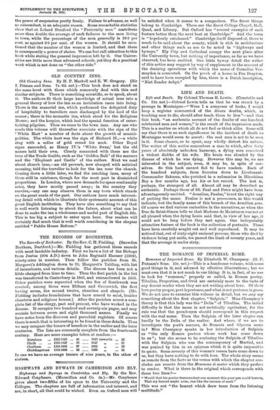LIFE AND DEATH.
Life and Death. By Colonel Thomas H. Lewin. (Constable and Co. 21s. net.)—Colonel Lewin tells us that he was struck by a passage in Montaigne—" Were I a composer of books, I would keep a register commented of the divers deaths, which, in teaching men to die, should after teach them to live "—and that this book, "an authentic account of the deaths of one hundred celebrated men and women," is the result of the impression made. This is a matter on which all do not feel or think alike. Some will say that there is no such significance in the incident of death as Montaigne would seem to assert : the real man is not to be seen in it. Some chance, so to speak, may wholly distort his nature. The writer of this notice remembers a case in which, after forty years of absolutely unbroken harmony, a dying man conceived a violent dislike of his wife. His brain was clouded by the disease of which he was dying. However this may be, we are interested in the subject, even, it may be, in spite of our- selves. So this book cannot fail to have readers. Each of the hundred subjects, from Socrates down to Lieutenant- Commander Sakuma, who perished in a submarine in Hiroshima Bay a few months ago, has his or her record. The last is, perhaps, the strangest of all. Almost all may be described as authentic. Perhaps those of SS. Paul and Peter might have been advantageously omitted. "Aemilins, Paulus," is not the right way of putting the name. Paulus is not a praenomen, as this would indicate, but the family name of this branch of the Aemilian gens. Of course we find various curiosities in the narratives, as when the Due de Saint-Simon tells us that Madame de Maintenon was not at all pleased when the dying Louis said that, in view of her age, it could not be long before they met again. One indisputably attractive feature of the book is the collection of portraits. These have been carefully sought out and well reproduced. It may be noticed that, out of sixty-eight eminent persons, those who died by violence being put aside, ten passed the limit of seventy years, and that the average is under sixty.






















































 Previous page
Previous page